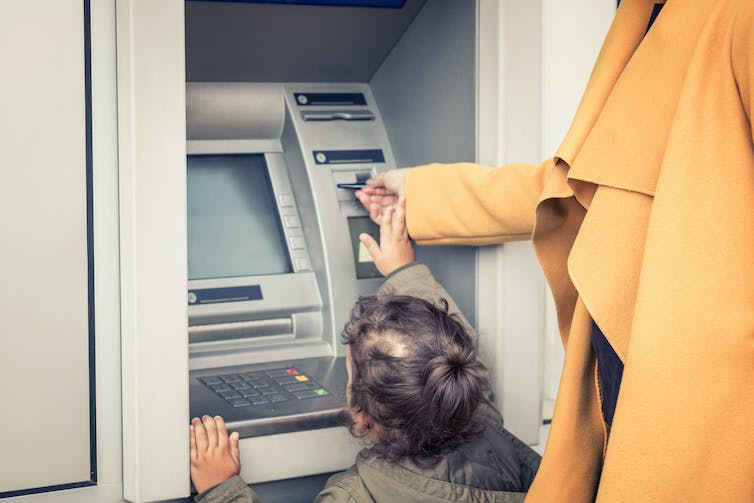Curious Kids: why do you get interest payments when you have a bank account?

Andrii Iemelianenko/Shutterstock
Why do you get money back when you have a bank account? – Grace, aged nine, Belfast, Northern Ireland
A bank is a place where people go to either borrow money or save the extra money they have. If you’ve got money to save, there’s a reason why it’s better to put it in a bank account than to keep it in a money box under your bed. In a bank account, your money will increase, because the bank will add what’s known as interest to it.
When you put your money in a bank, the bank gets to use your money. It might lend it to other people or businesses who need it. This doesn’t mean your money is gone: when you want to take it out of the bank, they will pay it back to you. The interest your bank pays you is a reward for letting it use your money.
So, let’s say you put a £100 deposit in a bank, and the bank promised to give you 5% interest every year as a reward. At the end of the year the bank would pay you £5 reward and so now the total amount you have in the bank is £105.
If you don’t take any money out, the following year you would get 5% on £105. At the end of that year, you’d have £110.25. You’re earning interest on your interest as well as the amount you put in the bank. This is called compound interest.

Curious Kids is a series by The Conversation that gives children the chance to have their questions about the world answered by experts. If you have a question you’d like an expert to answer, send it to curiouskids@theconversation.com and make sure you include the asker’s first name, age and town or city. We won’t be able to answer every question, but we’ll do our very best.
This is how money in a bank account keeps on growing every year. It’s like a snowball effect – the more money you have, the more interest you get, and the more your money grows. This is one way people can make their savings grow over time, and it’s a neat way to encourage people to save their money in the bank.
Borrowing and lending
You may wonder where the bank gets the extra money to reward you for letting it use your money. People may need to borrow money from a bank to buy a house or a car and businesses may want to borrow to invest in machinery or equipment – and banks charge interest to those it lends money to.
When households and businesses borrow money, they have to pay back the whole amount – plus a little extra. So, the money that the borrowers pay back to the banks in interest is the same money that the bank uses to pay you and other savers.

It’s a good idea to keep your savings in a bank account.
LumineImages/Shutterstock
The bank has to decide how much interest it should pay those who save with the bank, and how much it should charge those who borrow from it. The bank is a business, and it needs to make profits, so it charges a higher interest to those who borrow money compared to the interest it pays to people who save with it.
For example a bank may want to charge a person who wants to borrow money to buy a house a 6% interest rate, while paying only 4% interest to a person who saves their money with the bank. This means there’s money left over. The bank uses the extra money to pay to keep itself running, and whatever is left the bank keeps as profits.
Banks play an important role in our financial system by acting as a middle man between savers and borrowers. The interest rates charged to borrowers and paid to lenders form the foundation of a bank’s operations.
![]()
Shampa Roy-Mukherjee does not work for, consult, own shares in or receive funding from any company or organisation that would benefit from this article, and has disclosed no relevant affiliations beyond their academic appointment.







